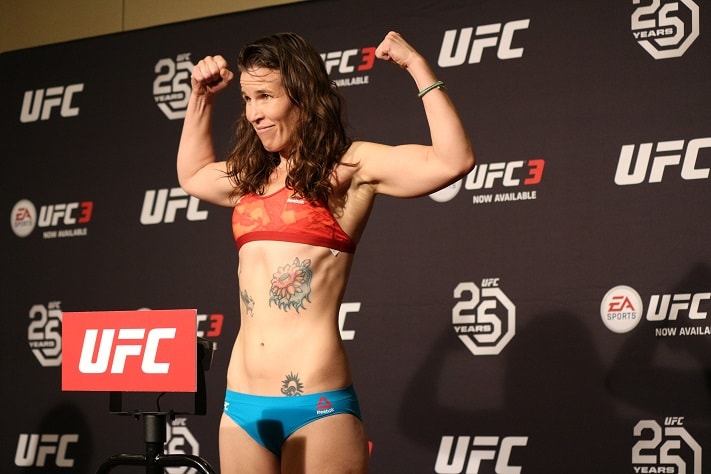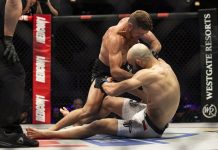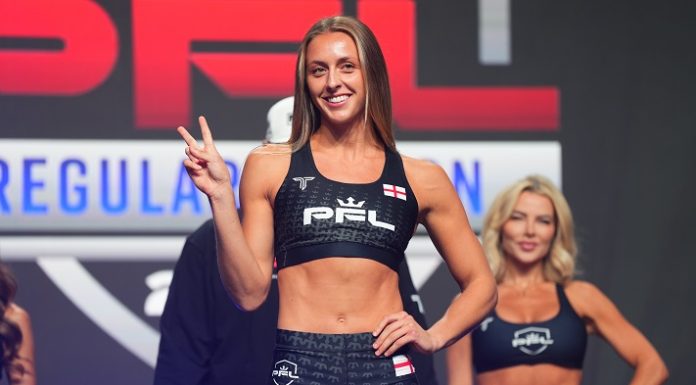
Smith’s last fight, the doomed bout against Aspen Ladd, wasn’t offered until she made a post on social media about meeting with the UFC. “After months of them ignoring me, one hour after I made that post, they called [my manager] up and said ‘Hey we’ve got a fight for you.'”
“I knew I was in the frying pan, and it was going to be put on top of the fire with all the union stuff,” she admitted. Although Project Spearhead wasn’t initially a unionization effort, having fighters declared employees was a step in that direction. “I knew it was my last fight, and the chances of me getting signed again after that were— I probably wasn’t their favorite person.”
The changes she wanted to make, which she calls “corrections,” through the classification of the fighters would have really made a big dent in the UFC’s business plan, she noted.
While Smith is happy with the effort she made to make things better for fighters, there is one thing she would do different. Following the UFC Atlantic City weigh-in, she spoke to a reporter. “I don’t even know her name. She was with ESPN I think, she put the microphone in my face and asked ‘what are you thinking right now?” recalled Smith. “And I told her everything I was thinking. I was like ‘New Jersey had me sign this bout agreement that says the UFC has to pay me if my opponent doesn’t make weight. This is literally the only time I’ve ever had any leverage with the UFC, I’m going to see if I can try to get two more fights added to my contract, I’d love to get a hundred thousand for each fight, that’s what I’m hoping for.'”
After that interview, the UFC refused to negotiate with Smith. The promotion told Smith’s manager that they had heard she was looking for $200,000 per fight. “I was like ‘no, that’s not what I said at all,'” but by that point, the UFC had shut down negotiations. “I probably wouldn’t have talked to her. I would have done everything else the same, except for not talked to her.”
Today, there hasn’t been a lot of movement on the Project Spearhead front. But Smith credits lawyer Lucas Middlebrook, who was a key part of the effort, with getting her back in the classroom. “He’s the reason I’m currently enrolled in school right now to get a degree in Labor and Employment Relations, and why I want to become a labor-side lawyer after this. Because he really opened up a whole world of labor law fascination to me.”
“As far as Project Spearhead goes, it exists mainly as an educational entity serving to keep up the idea of how beneficial it would be for fighters to have a union inside of the UFC.” Because Smith is no longer in the UFC, she no longer has the platform she needs to reach fighters like she once did. Smith also addressed the reason she’s not trying to turn her focus on Bellator, and start a similar push.
In doing so, Smith cited Bloody Elbow’s John S. Nash, who has provided ongoing coverage of the anti-trust lawsuit against the UFC. Separate from Smith’s Project Spearhead, the anti-trust suit was brought about years ago by a number of former UFC athletes. Of note, figures released during hearings last year that were later reported by Nash showed the UFC’s wage-share percentage with fighters, as well as that of Bellator, and pre-Zuffa Strikeforce. For the UFC, this number generally hovers somewhere around 18-20%. Bellator’s figure was just under 45%, while Strikeforce, prior to being aquired by UFC parent company Zuffa LLC, had an astonishing 63% when it came to wage-share.
Beyond that, Bellator brings in far less revenue than the UFC, and the PFL even less than that. Other promotions, said Smith, “aren’t really in competition, they’re just not as big.”
“Most unionized sports are 49 to 51%,” she noted, using the NFL, MLB, and NBA as examples. “That’s what Bellator is already doing. The UFC on the other hand is doing like 16%, 17% [depending on year]. It’s a whole different ballpark as far as the money coming in.”
Smith’s not against starting up another union card drive on behalf of fighters, however, if they do reach out. If that happens. In the meantime, her focus is elsewhere. “Until I see clear evidence that the fighters are ready to stand up, get off their knees,” she said, “I am going to keep working on myself, my career, and my education. And educating other people as much as I can.”
Leslie Smith returns at Bellator 241 this Friday, March 13 at the Mohegan Sun Arena in Uncasville, CT.





















